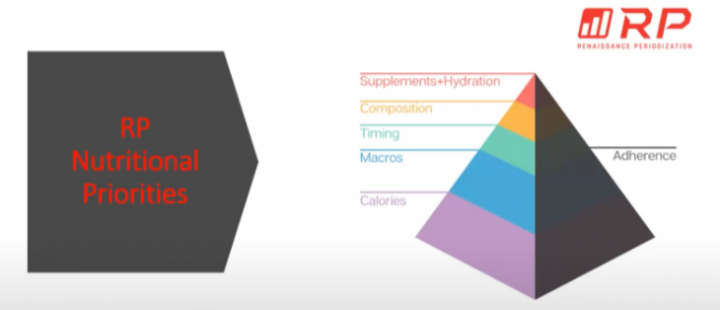LIFEAID talks Nutritional Priorities with Nick Shaw
LIFEAID held a seminar for Renaissance Periodization Nutrition to learn more about sports performance and the importance of your diet – everything from healthy calorie balance to macro breakdown can have a major effect on your body in the short term long term. Founder Nick Shaw broke down their pyramid of importance when it comes to feeling good in the gym, losing fat and/or retaining lean tissue.
Who is RP?
Renaissance Periodization or RP is a platform that aims to deliver the most effective, scientifically sound, and reliable diet and training consultation to anyone looking to achieve success in the areas of physique alterations, sports performance, and health. They’re all about helping you target your time and effort into methods that work. RP lives and breathes fitness, nutrition, and sport, as well as educating whoever wants to learn. So if you’re someone starting your fitness journey or looking for the right knowledge and information to better yourself, RP is the perfect place!
The pyramid above is broken down into 6 categories of importance. The most important being adherence followed by calorie balance, macronutrients, nutrient timing, food composition, and supplements + hydration. Each category plays a pivotal role in your success in the gym and overall, feeling good.

Adherence
Adherence can simply be broken down into the fact that consistency is key. Not just consistency over the short term but more importantly over the long term. It is important to develop habits that add sustainability to your nutrition. We’re not just talking weeks or months, we’re talking years. Once you have a successful plan, knowledge is power. RP can assist you in gaining the knowledge you need to be successful on your journey. If you don't have adherence, no matter the nutrition plan, you're not going to get too far.
Calorie Balance
Calorie balance is about 50% of your dietary success. This is all about calories in vs. calories out. The way you handle this factor, sets the foundation for your dietary and physical goals. To reach your goals, you have to nail calorie balance. If you do not, it is very similar to having a really nice sports car that just sits in the garage. If you do not gas it up, it is going nowhere. Depending on your goals, there are two states of calorie intake in which you can be. If you are consuming more calories than you are burning (i.e trying to gain weight and muscle) you are in a hypercaloric state. If you are burning more calories than you are consuming (i.e losing weight) then you are in a hypocaloric state. Then if you are pretty even, that is a eucaloric state or a maintaining state.
Macronutrients
Your macros make up about 30% of your diet. These macros include carbs (4 cal per gram), proteins (4 cal per gram), and fats (9 cal per gram). The most important of these are proteins. Roughly speaking, you should be consuming 1g per pound of body weight. Your protein intake will be based on your goals and it is key to keep track of your performance. The second most important are carbohydrates. Carbs have the biggest range of intake because it is based on how much physical activity you take part in. Simply put, more activity and exertions means there is a need for more carbs in your diet. Finally, fats are the first place to lower calories in your diet. It is important to try and focus on more unsaturated fats than saturated fats. When cutting back fats, be sure to keep proteins and carbs high.
Nutrient Timing
10% of this pyramid is based around nutrient timing. This is broken into two categories. Meal quantity vs. meal distribution. Meal quantity is simply how many times you are eating throughout the day. You should try to focus on 3-5 times a day, every 4-6 hours. Meal distribution is how you consume these macros based on time of day and when we train. This is also based on your weight goals, whether you are trying to lose or gain weight.
Food Composition
People think the types of food you're eating matter the most but that’s not necessarily true. As long as you're hitting your numbers, the type of food should not matter. In terms of proteins, you can get those from animals or on a vegan diet. When it comes to carbohydrates, there are either your GI carbohydrates that include oatmeal, sweet potatoes, fruits and veggies. Or there are your higher GI carbohydrates which should not be eaten as often. Your fats can either be unsaturated or saturated. Most of your unsaturated fats should come from nuts, avocados, or olive oils. Your saturated fats include grass fed beef or coconut oil, these are the healthier ones that you should try and stick to. However, these should not make it the bulk of your fat intake.
Supplements + Hydrations
RP gave us their top 5 supplements:
- Whey protein
- Casein Protein
- Workout Supplements w/ Carbs (for athletes training for an hour or longer)
- Creatine (amounts based on your workout goals)
- Caffeine
All these are great to incorporate into your diet to help you achieve success on your fitness journey.
Tag us on Instagram with your favorite nutritional tips that you’ve incorporated into your daily life! @fitaid

